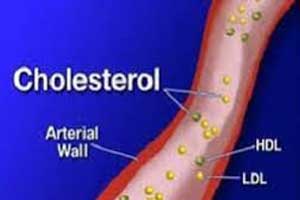- Home
- Editorial
- News
- Practice Guidelines
- Anesthesiology Guidelines
- Cancer Guidelines
- Cardiac Sciences Guidelines
- Critical Care Guidelines
- Dentistry Guidelines
- Dermatology Guidelines
- Diabetes and Endo Guidelines
- Diagnostics Guidelines
- ENT Guidelines
- Featured Practice Guidelines
- Gastroenterology Guidelines
- Geriatrics Guidelines
- Medicine Guidelines
- Nephrology Guidelines
- Neurosciences Guidelines
- Obs and Gynae Guidelines
- Ophthalmology Guidelines
- Orthopaedics Guidelines
- Paediatrics Guidelines
- Psychiatry Guidelines
- Pulmonology Guidelines
- Radiology Guidelines
- Surgery Guidelines
- Urology Guidelines
Novel PCSK9 inhibitor, Inclisiran causes significant reduction of atherogenic lipoprotein

Inclisiran, a small interfering RNA (siRNA) that inhibits proprotein convertase subtilisin kexin type 9 (PCSK9), produces significant and prolonged reductions in atherogenic lipoprotein, suggests results from secondary analysis of ORION-1 trial.
The ORION-1 trial demonstrated that inclisiran produces significant low-density lipoprotein- cholesterol (LDL-C) reduction. The effects of inclisiran on other lipids are less well described.
The study was published in the journal Circulation and presented at the European Atherosclerosis Society (EAS) 2018 meeting.
Kausik K. Ray, professor of public health in the Department of Public Health and Primary Care at Imperial College London, and colleagues conducted the study to explore the effects of inclisiran on the atherogenic lipoprotein.
ORION-1 was a phase 2 trial assessing 6 different inclisiran dosing regimens vs placebo. Participants with elevated LDL-C despite receiving maximally tolerated statin therapy received a single- (200, 300 or 500mg) or two-dose starting regimen (100, 200 or 300mg on days 1 and 90) of inclisiran or placebo. This prespecified analysis reports the percentage reductions in non-HDL-C, apoB, VLDL-C, Lp(a), TG, HDL-C and ApoA1 at the primary efficacy time point (day 180) using mixed-effect models for repeated measures. Additional prespecified analyses report time course of changes from baseline at each visit to day 210, inter-individual variation in response, and lipid goal attainment.
A total of 501 participants were included in the trial, their mean age was 63 years; 65% were male; 69% had the atherosclerotic cardiovascular disease; 73% used statins; mean LDL-C was 128mg/dL.
Key findings:
- A single dose of inclisiran reduced apoB, non-HDL-C, and VLDL-C over 210 days and the second dose of inclisiran provided additional lowering of these lipids.
- At day 180, non-HDL-C was lowered dose-dependently, by 25% from 148 ( ±43) mg/dL to 110 (±45) mg/dL in the 200mg single-dose group and by 46% from 161 (±58) mg/dL to 91 (±58) mg/dL in the two-dose 300mg group; for the same dosing regimens apoB was reduced by 23% from 101 (±23) to 78 (±29) mg/dL and by 41% from 106 (±31) to 65 (±33) mg/dL.
- In the 300mg two-dose group, all individuals experienced apoB- and non-HDL-C reductions.
- There was larger inter-individual variation in VLDL-C, triglycerides and Lp(a) reductions.
- In the 300mg two-dose group, the percentage of patients achieving guideline-recommended apoB goals for high- and very high-risk patients at day 180 were 78% and 90%; 68% and 83% of participants achieved non-HDL cholesterol <100 mg/dL and <130 mg/dL.
"Inclisiran produces significant and prolonged reductions in atherogenic lipoproteins, suggesting that inhibiting synthesis of PCSK9 through siRNA may be a viable alternative to other approaches which target PCSK9," concluded the authors.
For further information click on the link: https://doi.org/10.1161/CIRCULATIONAHA.118.034710

Disclaimer: This site is primarily intended for healthcare professionals. Any content/information on this website does not replace the advice of medical and/or health professionals and should not be construed as medical/diagnostic advice/endorsement or prescription. Use of this site is subject to our terms of use, privacy policy, advertisement policy. © 2020 Minerva Medical Treatment Pvt Ltd